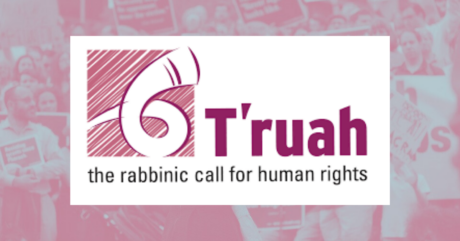BOSTON, MA – Constituents across the Commonwealth are pressing Governor Baker to sign the Jail and Prison Construction Moratorium included in the Infrastructure Bond Bill (H.5065). Today, 28 Jewish clergy representing hundreds of congregants across the state sent a letter to the Governor calling on him to make the Prison Moratorium law without amendment.
T’ruah: A Rabbinic Call for Human Rights has supported lead organizations Families For Justice as Healing (FJAH) and The National Council for Incarcerated and Formerly Incarcerated Women and Girls (The National Council) as key partners in the statewide campaign to establish a five year pause on jail and prison construction- including the new women’s prison. Supporters of the Prison Moratorium want the state to focus on releasing women from MCI-Framingham and resourcing community-led solutions to stop the flow of people into incarceration.
“We are asking you to sign H.5065, including the Jail and Prison Construction Moratorium,” the T’ruah letter reads. “The moratorium would transform the next five years into an opportunity to further reduce the incarcerated population, implement alternatives, and invest in community health and safety.”
The clergy, all members of T’ruah, have supported the Prison Moratorium Campaign by attending rallies, meeting with legislators, and hosting town halls at their congregations with directly affected leaders. “In every interaction with Families for Justice and Healing, they have painted a picture of a world made beautiful by investment in communities and individuals, rather than prisons and punishment. They have shown me a vision of olam habah, the world to come, where all people can thrive” said Rabbi Becky Silverstein, co-chair of the Boston T’ruah Cluster.
The clergy point to the values of their tradition as the motivating force behind their support for the work of Families for Justice as Healing. “Judaism teaches that we should be held accountable for our actions, while also upholding repentance and repair as the ultimate goal,” their letter reads. “With FJAH and The National Council, we affirm that prisons are not places where people can heal and rebuild their lives. To truly build a world of justice and accountability, we need to create a world where everyone can thrive.”
There are currently less than 200 women at Framingham – including 31 women held in pre-trial detention from Middlesex County, many of them likely held on bail they cannot afford. The DOC reports 18 county sentenced women from Middlesex County and 134 state sentenced women. Fully ⅓ of the state sentenced population are older than fifty. Many have significant and debilitating illnesses, including dementia and end-stage chronic obstructive pulmonary disease (COPD). Rather than building a new women’s prison, T’ruah clergy believe the state must pursue every possible pathway to bring women home to receive the healing and healthcare they need and deserve – including clemency.
The T’ruah letter urges Governor Baker to “use your power of clemency as a tool for gender and racial justice, and to release women over the age of fifty, women who are sick, and women who have been incarcerated for more than 10 years. As you approach the end of your final term, we hope that you take these actions to leave the Commonwealth a more just place and to set a precedent for what community transformation looks like.” Governor Baker has underutilized this key executive power and granted clemency to just two men.
#NoNewWomensPrison campaign supporters emphasize that there is no safe prison for women and now is the time to create a different way forward. “As a rabbi dedicated to the building of a just society, I am grateful for the prophetic leadership of formerly incarcerated women at Families for Justice as Healing and The National Council in rejecting the construction of a new women’s prison. Jewish tradition promotes the belief that every human being is capable of teshuvah, repentance, and that our actions must be grounded in the understanding that human beings are created b’tzelem Elohim—in the image of God,” said Rabbi Jim Morgan of Harvard Hillel and Hebrew SeniorLife, and member of T’ruah. “With this in mind, we must invest in alternatives to incarceration that will allow families to remain together and women who have committed transgressions to recommit themselves to their communities.”
FJAH and The National Council are already organizing to create what different looks like in the most incarcerated neighborhoods in the Commonwealth. “We will continue to do the work on the ground to heal our people and build our communities’ infrastructure. We know that is what communities impacted need – not new jails and prisons,” said Joneisha James, FJAH and National Council Director of Reimagining Communities. “We have reached out to the Governor many times – including during the worst moments of the COVID-19 pandemic to ask him to release women who were sick and suffering. Now we are asking him again to do the right thing before he leaves office.”
T’ruah: The Rabbinic Call for Human Rights mobilizes a network of more than 2,300 rabbis and cantors from all streams of Judaism that, together with the Jewish community, act on the Jewish imperative to respect and advance the human rights of all people. Grounded in Torah and our Jewish historical experience and guided by the Universal Declaration of Human Rights, we call upon Jews to assert Jewish values by raising our voices and taking concrete steps to protect and expand human rights in North America, Israel, and the occupied Palestinian territories.

